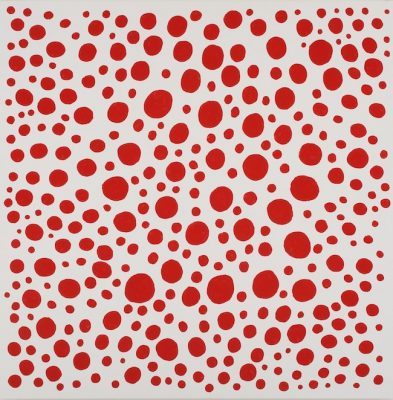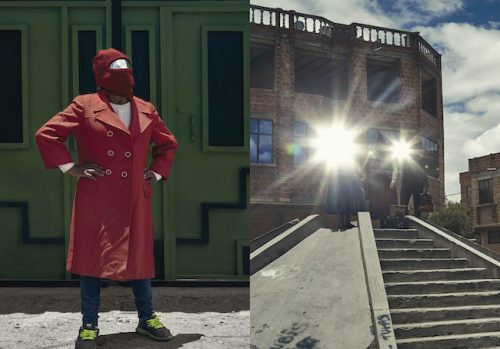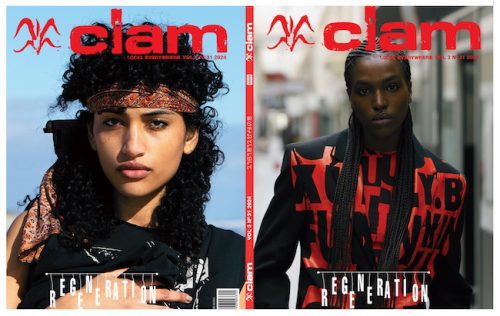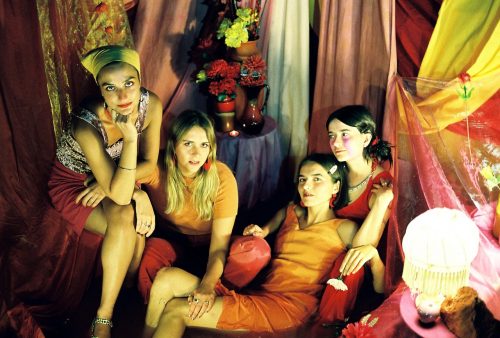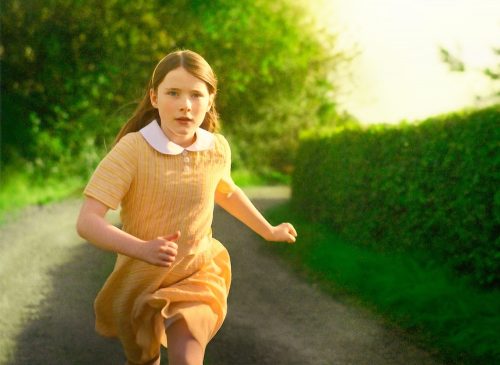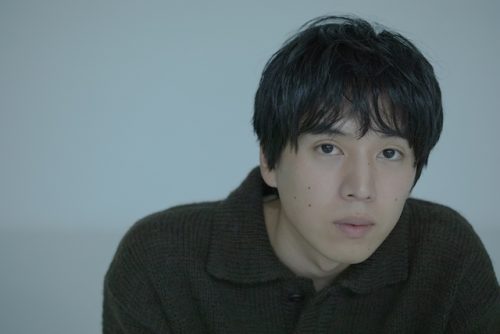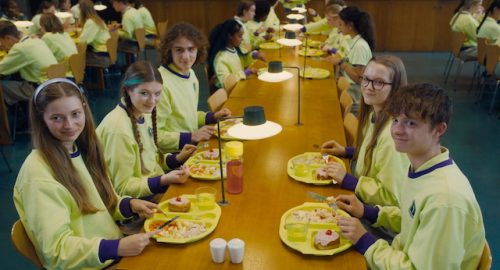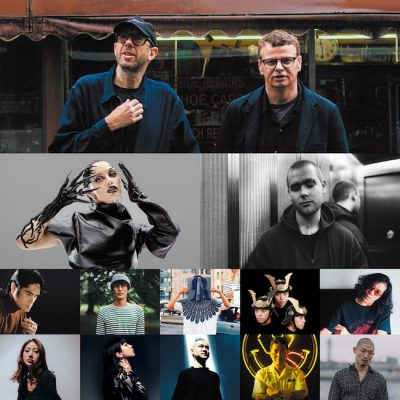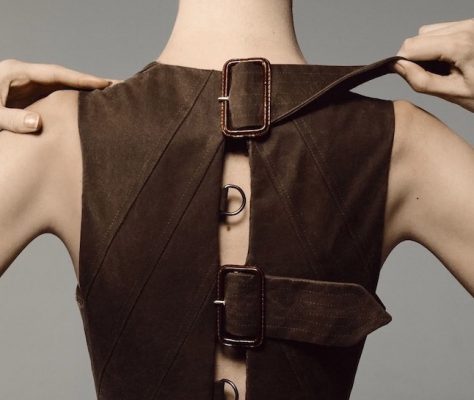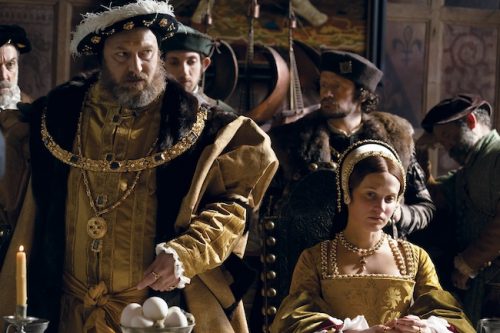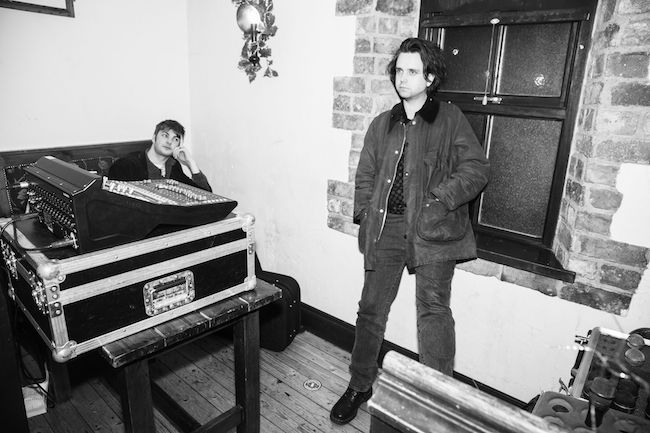
— I think the new album “A Hero’s Death” is the upgraded version of the image of the band which you guys have established with the debut album “Dogrel”. In this interview, I’d like to ask you about how this new creation “A Hero’s Death” was born and how the band changed through making the record.
Grian : Okay.
— Before I start asking you about the new album, could you look back and tell me what does the previous album “Dogrel”, which spread the name of the band Fontaines DC to the world and got nominated for the Mercury Prize, mean to you?
Grian : That record is a commentary of the environment that we were living in at the time, which was specifically a certain kind of area, mainly the city center. We were very influenced by the ghosts of the past, you know. The haunted streets, statues of great writers, great artists, and great poets. I think we wanted to channel that extent. We love Dublin. We kinda wrote about stories of our life at the time and characters in Dublin. This album is very much a commentary on this audience, much more confessional.
— As you just said, through “Dogrel”, you were talking about the loss of Irish tradition and culture of Dublin which was caused by the expansion of capitalism, such as Brexit, worldwide economical crisis, or gentrification issues. But what was the actual message you guy tried to convey with the album?
Grian : I’m always afraid that kind of question because I don’t really want to try to reduce or try to say over to sentence, you know. Because I feel like it’s sort of dangerous. But I think that the feeling on the record is one of kind of entrapment and hope. Kind of being stuck or trapped in place and being haunted be the home that you can get out.
— Were you conscious about talking about whats going on in the world, such as Brexit, on this album either to let your feelings out or spread the awareness to more people?
Grian : We certainly weren’t consciously thinking about Brexit. And we do try to avoid talking about that kind of stuff too much really because it probably wouldn’t affect the economy in different countries. So we didn’t have to worry about what the English politician was.
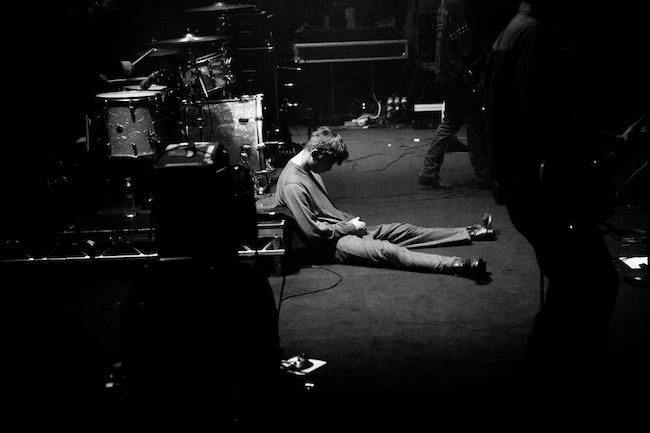
— I remember you were saying “For theist couple of decades, Ireland has pretty much been looking over to London for inspiration. It’s only beginning to cut the creative umbilical cord now. It’s the first time in a while and I think the reason for that is Girl Band.” On the interview for earmilk last year. A variety of bands are coming out of Ireland, Dublin these years including you guys, and they all are active in some music scene. What do you think is making this phenomenon?
Grian : I think one great thing that inspires music in places like London usually is that they have a real discourse about government and politics from an early age. I think what they do is they breed a healthy distrust in the government, and young people have really been up to gauge. What’s happened is, there’s been certain referendums recently that were really important like gay rights, abortion rights, and all there things. These things are important and imperative in bringing Irish youth into politics. I think what that’s done now is it’s kind of empowered lots of people in Irish music. There’s kind of almost a common enemy, you know. And that’s really important for creativity.
— What do you think Girl Band did for that?
Grian : I think what they did was, they’re certainly influenced by My Bloody Valentine, but for the most part, they don’t sound like they’re typically Irish. They don’s sound like they’re from anywhere really. They kind of sound like they’re from Mars. I think what that did is, it reimagined what artists meant to be. Instead of redefining, it completely reimagined it. I think that was really exciting.
—Do you think Girl Band changed Irish music scene a lot?
Grian : Yeah I think so. For me, one of the main problems with Irish music is it’s often been very apologetic and very soft. But I think it’s developing its edge now. I think that bands like Whipping Boy did a great job of kind of having sort of pride and confidence. But for the most part, with bands like Ash and stuff, they write nice songs but they’re not edgy enough. But I think that’s on the development sides now. It’s developing because Girl Band came out with the edgiest kind of music in Europe. Then that made people think, why not have that and be at the fotefront of cutting edge music.”
— I bet it’s really hard to keep the balance between trying to hold some Irish sound in a way to inherit the tradition and trying to make something new or unique to yourself.
Grian : Yeah totally. I do want to preserve our culture and I also want to make some interesting music, you know. I think Girl Band is the band who don’t have to worry about it too much. They’re entirely original and organic. And that’s why they’re great. But I like the romance, wisdom, and compassion in traditional Irish music as we. And it’s probably something that I will explore a lot more in the future.
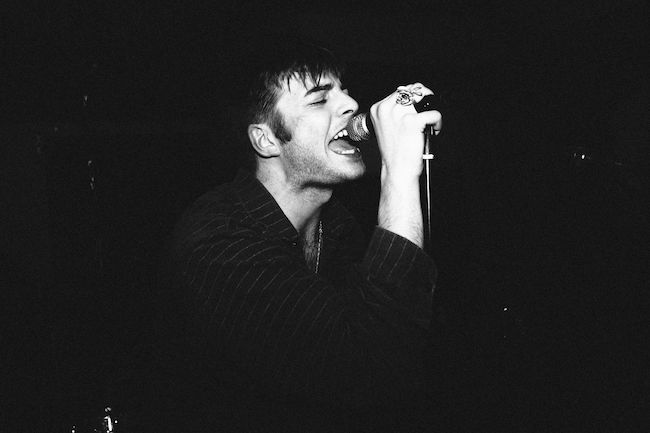
— Okay, now let me ask about the newest album “A Hero’s Death”. For me, it felt like “Dogrel” is more like a portrait or soundtrack of Ireland/Dublin, and the new album is more like a portrait or soundtrack of the band, Fontains D.C., and yourselves. What kind of blueprint did you guys have in your mind when you guys started making the album?
Grian : First of all, the most important thing that we kind of considered for the new album was not to write as a reaction to the first album. What’s people’s expectations or critical expectations. And what we decided was that if we were to consciously write a different album for the sake of being different and surprising, that would be as conformist as writing an album to establish a sense of community for community sake. Both things are contrived, and therefore detrimental to the process. So we wanted to write an album in absolute ignorance of having been a pre-existing album.
Yeah so in a sense, this is kind of like another debut album. I’m sorry, your question was more about this being reflective towards ourselves. I think that’s because we didn’t have an environment to write about Ireland or Dublin because we were on tour all the time, and I also didn’t want to write about being a rock ’n’ roll band on the rolls, you know. Because I don’t want to put on and don’t sound like the Foo Fighters denominator (laughs). I’m not living in Beverly Hills drinking champagne, and just playing really loud guitars. So we decided that the place we still exist and that everybody else exists is within ourselves and that was really the place that we were talking about all along. Even the first album wasn’t really about Dublin. It was about the place within ourselves anyway.
— Do you think the experience of touring the states brought something to the band though? Like there’s a track called “Living in America” on the album, we heard that the America tour after “Dogrel” had huge influence on the new record. Can you tell us how?
Grian : It was nothing specifically America or out time in America. It was more of the surrealist sort of experience of America that we have, you know. It was when we were not sleeping, weren’t taking care of ourselves. And I needed to drink an awful lot to go on stage overnight because I went six days without any sleep, I just got insomnia. The while time was rough, and we were trying to enjoy it. At the same time, we were trying not yo worry about those great sense of hysteria, about the time there. And that’s what we were trying to capture.
— Did the experience of being in America so long change the band in any way?
Grian : Honestly, it changed us in a good way. It didn’t make us more worldly or more cultured because we didn’t really experience too much. We were traveling most of the time. However, it often accentuated my sense of Irishness. When I’m in a different country like America, I begin to wrap myself in Irish muscles to protect myself from the rest of the world.
— That’s interesting, and it does make sense. So America wasn’t the direct influence for the album. Then what is the concept or the theme of the album?
Grian : I just had things that I needed to express, and I had things that I needed to organize within myself. I think that went on and expressed. There were many things , you know. And some bad things have happened to us in our personal lives or whatever. We didn’t have the time to sort it out so we just had to move on because we were just working around, just go! go! go! all the time. I think that part of ourselves was screaming for a voice. So we just gave it that voice.
— In an interview, you were talking about the album using the words like “Imaginary Universes” and “Introspective Journey”. Do you think escapism is one of the element of the record?
Grian : Absolutely. Yeah, I think we needed to escape. We were almost like malnourished spiritually, so we just had to wrote ourselves a wreckage.
— So was writing the songs for the album like some kind of therapy for you?
Grian : Yeah absolutely. I suppose in a way, I’d never really want to write music if it wasn’t therapeutic. Because what I think is that if it’s not for you, then it’s not from you, you know.
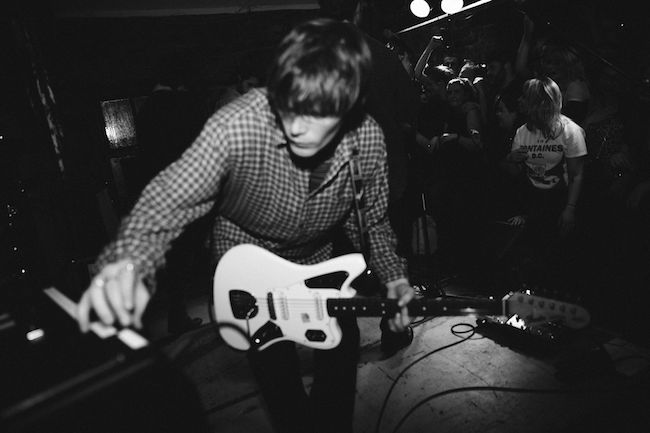
— True. Now tell me about the sound of the new record. We see the names of artists like the Suicide, The Beach Boys, Leonard Cohen, Lee Hazlewood, Beach House, Broadcast, as the influence on the album. What kind of image or ideas of the sound did you guys have for the record?
Grian : I’d say positive sound. It was like, like a wooden boat floating on an undulating river, and light shining from beneath the surface of the water on them. Kind of footsteps echoing in. In moments of tranquility and serenity, yeah.
— Did you have any discussion about sound ideas with the producer Dan Carey?
Grian : He’s incredible to work with because he understands you straightaway. You don’t really need that discussion because he feels it all straightaway and is incredibly empathetic as a producer. So I think we sent him the album, our demos. Then he said he wanted to have a sound like the music is an audience surrounded by, like in a town. At the Bottom of a mountain, not devote the vocals are broadcast from the top of the mountain.
— Did you guys try anything new this time to make the sound you guys wanted for the record?
Grian : We still wanted to keep it very much live as its core. So all of the album was recorded live. But there was some stuff we wanted to put over, and I think we’ve probably paid a lot more attention to guitar tones and stuff.
— Yeah, I was gonna ask you about that textual guitar sound on the album. “You Said” and “Oh Such a Spring” have some acid folkish atmosphere even. How did this transition happen?
Grian : I think, you know, when you go on stage and play the same 11 songs from an album 300 times, the sound started sounding like something else. And then, we really needed to give voice to those part of ourselves. So when we wrote songs like “Oh Such a Spring” or “You Said”, we needed to slow things down. We needed to look around, recuperate, and love ourselves. We need to stop being so faded paced all the time. We needed to look back and think about things, and reflect what’s worthwhile, you know.
— Did you find anything new you want to try next time through the process making the album?
Grian : We have kind of fallen back in love with Irish music. I think what happened was we bond as friends more, we bonded over a certain amount of Irish musicians, then we went on. We didn’t really develop on our repertoire of Irish music while we were in places like Switzerland and France and the states, because it just didn’t really seem like the kind of time to develop our taste in Irish music while we were in those places. But now we’re all back together and creating new memories, and building an audience around. Irish traditional music feels relevant to us again. So I wouldn’t be surprised if the next record has more of the element.
— What was the initial idea for the track “A Lucid Dream”? I can feel some shoegazing sound scape and reminds me of Beach House or Broadcast.
Grian : I woke up from a dream, a lucid dream I was in. I was in the middle of the Irish rebellion in 1916 against British oppression. And we thought that I was kind of in the middle of it all and there was gunfire going everywhere. And it was outside the GPO, which is the . And so, I woke up from the stream and it was a crazy kind of dream. It felt like a hurricane. So I just want to write a song about it. The music really was written to give that feeling of being in a vivid lucid dream with bullets flying over your head and madness and revolution.
— What about “Love is the Main Thing”? We can hear some dub or krautrock influence on this track.
Grian : I wanted to, we wanted to play the sound of like really high ceiling of techno. Kind of dance music. And added the melody on it with this kind of close up, tired voice. It was what Dan was interested and he said that he wanted to make the bass drum sound like the party was happing next door. Kind of horizontal, you know. As for the context, love is the main thing but it’s also somebody trying to convince themselves of that. Somebody’s watching people being able to express their love for one another, and being envious. And that’s why it sounds like it’s next door.
— What do you think made you guys want to play techno or dance music?
Grian : I think it was because we live in a world of such confusion. In that world, you try and find some truth within you and recover the person that you are, and the values that you have. And try and carve out some definition of them. I think that’s what we need to do with the worlds. There are a lot of things that just needed to be organized. It’s almost like the whole world is engaged in any kind of silent arguments presented. And it needs to just burst.
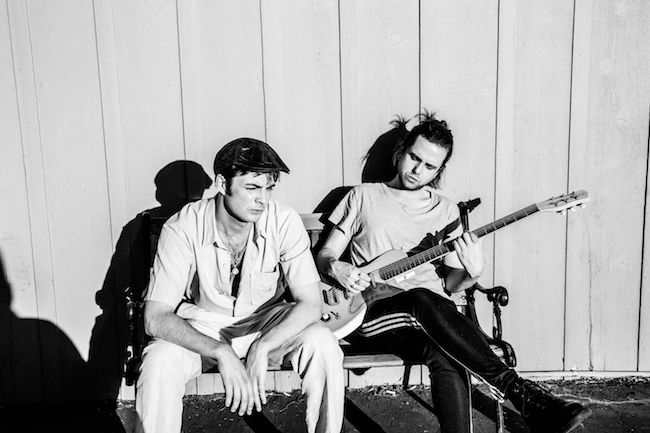
— What’s the story behind the album title “A Hero’s Death”?
Grian : The original idea came from Brendan Behan’s play. He’s an Irish writer from the 50’s and 60’s. He has a play called “The Hostage”. It’s a line that a woman says in the play basically. The play is about the Irish struggle for independence in Ireland. They have and English soldier hostage, and they begin to complain to him. And it becomes more and more humanized as it goes on. Then a woman walks into the room and just says “You’re all looking for a hero’s death.” Brendan Behan is funny and relatable. It’s kind of dismissive and funny. He takes something that’s serious, profound, and revolutionary as a subject, and reduces it into something like your own generic. For heroes that no one wants, what’s wrong with just being you? I found it very inspiring. I thought that would be a good title because I thought it’d be a funny name for a second album. For all the people who are expecting a particular thing, or anyone who liked our first album and might not like our second album. That’s a hero’s death. It’s funny and makes sense.
— On the interview for NME, you were saying “I’ve been thinking about why I write and why I’ve always written, what I’m getting out of it, and a lot of it is to let myself know that I’m still alive.” Did you discover anything new this time through making the album?
Grian : I discovered that we have a choice to say no. And even though this album is a lot more serious and almost maybe depressing, I think it’s more playful in a way. And especially musically, there’s a sense of great freedom.
— Can you tell us a bit more about that?
Grian : You know, even though it might sound sad or depressing, the imagination involved in some of the songs like “Love is the Main Thing” and “A Lucid Dream”. Just being able to express that gave us loads of joy. And the whole thing was, when we were working with Dan, it was just like six friends having loads and loads and loads of fun, not worrying about what anyone’s gonna think of the record.
— What kind of feeling is reflected on the track “I Don’t Belong”?
Grian : I think it’s a rejection of people’s expectations about our music. It was brought on by that feeling of there’s a world out there. The world waiting for our next music or waiting for us to get on stage and play. Play the hits, you know. It was just like a reaction against that. But it wasn’t something I decided. It just came out spontaneously.
— How about “I was Not Born”?
Grian : Same kind of message (laughs). So I think, there a great deal of disagreement in conversations you have with people who just want to give you compliments about your music. That can be nice. But sometimes when somebody is being nice to you, all you want to do is run away. I think that leaves me wishing that I was more individualistic and a bit stronger. I think that’s why I wrote those tunes.
— So what’s coming up next? Can you share your future plans with us?
Grian :For the first time in my life, I feel inspired to write about tome news stories. Specifically ones about The Church of England and Irish gravestone. The Church of England has rules that and Irish-language inscription on a Coventry gravestone must have a translation with it to ensure the phrase is not mistaken as being a political statement. I think you can’t say our culture is political culture and it really really offended me and insulted me, and it made me angry. Other than that, I’m moving to Camden, London next week and hopefully start performing at some places and in different cities soon. I do hope we can come over to Japan soon too!
— your Japanese fans are hoping that too! It was such a bummer Fuji Rock got cancelled and we had to miss the opportunity to see you guys performing this summer. Can you give a message to your fans in Japan?
Grian : I love you Japan! We can’t wait to come over and play some shows in Japan real soon!
— Thank you so much for your time today.
Grian : Thank you!
photography Pooneh Ghana(JP)/Kevin Condon(EN)
text Junnosuke Amai




